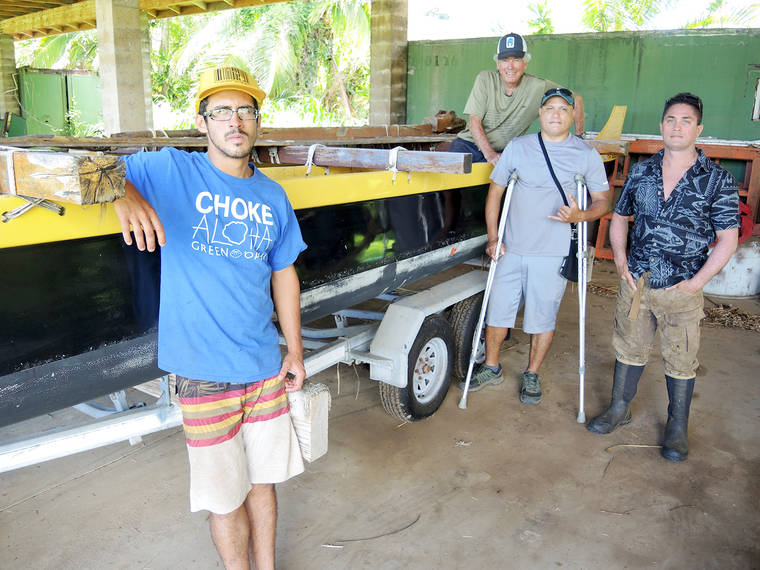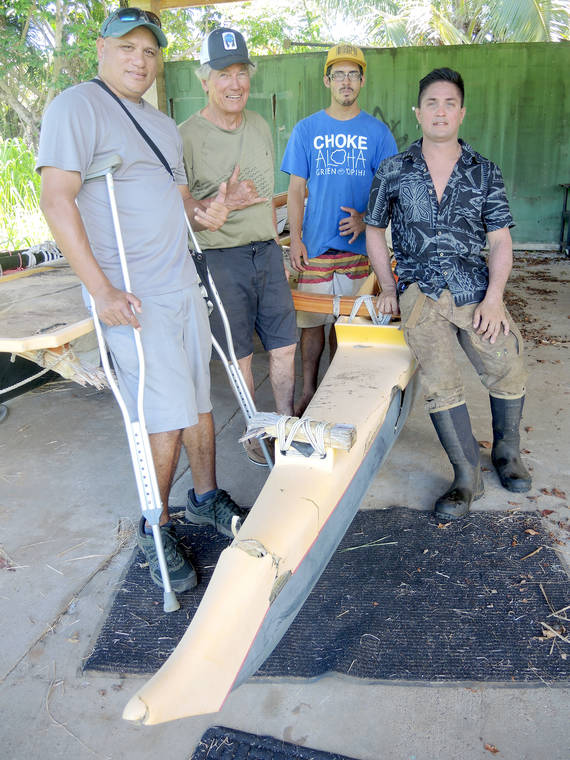HANALEI — Restoring canoes, said Kamealoha Hanohano Smith, is just the beginning.
The Hanalei River Heritage Foundation of which he is the director has bigger plans to share Hawaiian culture and traditions.
“Everybody is getting excited about teaching youth how to monitor coastline resources and also teaching them about traditional food systems,” he said.
The foundation recently received a $19,000 First Nations grant, and has raised just over another $10,000.
“There’s a lot that’s packed into this small grant,” Hanohano Smith said. “The idea is to meet with youth about once a month over the next year to get them engaged in things that have to do with Hawaii culture and spiritual practices.”
The restoration of their canoes near the Hanalei River is key to their goals. Three were damaged in last year’s April flooding. Water rose to 12-feet high in the covered shop area, ruining tools, machines and leaving piles of debris and mud behind.
But the foundation rose to the challenge of putting the pieces back together and is forging ahead.
Hanalei River Heritage Foundation recently started its youth program and has high hopes to build a strong base, especially with summer days here, perfect for families and keiki to be out on the water.
But first the double-hulled sailing canoes need to be cleaned, repaired, sanded and painted, expected to take a few months.
“We had to rescue them when they ended up on the other side of trees,” Hanohano Smith said as he looked across the field of grass.
Michael Sheehan brought one of the canoes over from the Big Island, where it was also used for youth education.
“Before we really got to use it, in came the flood,” Sheehan said.
The foundation is seeking more funds to help with the project, expected to cost around $10,000. It also hopes to further establish its home near the Hanalei River.
“If we can get a little bit more money, more resources, we can have more of a regular physical presence here,” Hanohano Smith said.
The Hanalei River Heritage Foundation was founded in 2009 and has served more than 1,000 youth. It partners with the Native Hawaiian community to increase opportunities for native youth to learn and study traditional knowledge environmental stewardship.
The Foundation has three youth programs: traditional sailing and navigation, agricultural stewardship, and nearshore fisheries management. It also partners with cultural/spiritual practitioners/elders “to work with our youth to revive traditional knowledge to reclaim and restore their identity to help make them more resilient and self-reliant.”
“Although the 2018 floods devastated our traditional fishing grounds, it gave our Native community a reason to come together to talk story about traditional fishing,” it states in the application.
Part of their native identity as islanders is a strong bond with ocean resources.
“Not long ago, fishing was taught as an integral part of growing up on Kauai. We are concerned that if we do not move forward with Project Waa Kupono and other like projects, the language, practices, and entire way of life associated with Native fishing will be lost,” the application says.
Project Waa Kupono helps youth to face and overcome challenges of living in 21st century Hawaii.
The Foundation plans to work with youth to restore the canoes using both modern and traditional methods.
It will use the canoes as mobile classrooms to teach youth about traditional food systems and conservation practices of natural resources in and around the marine reef ecosystem.
“This proposed project will afford the opportunity to revive Hawaiian ancient wisdom and combine it (with) some scientific methods to restore canoes,” according to the grant application.
The Foundation plans to serve 30 youth from ages 14 to 24 during the grant period.
Sheehan said the foundation’s goals are “symbiotic of how we should be living in our community, together, helping each other.”
“It’s something people can rally around,” Sheehan said. “The concepts of togetherness, working as a team.”
Ka‘imi Hermosura said he hopes to share his knowledge and pass it on to youth so they can do the same in the future.
“This helps us to restore our traditional practices,” he said.
Hanohano Smith said the community is welcome to be part of their efforts.
“It’s been a journey this past year,” he said.



